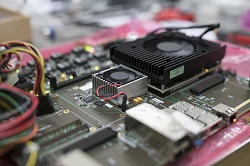Fronthaul for 5G
As computer data storage embraces the cloud (integrated remote devices) theme, so too does network communications. A cloud-radio access network keeps key functions (digital, processing and baseband) at a central location, and radio equipment (antennas, amplifiers) at another site. In such a network, high-performance processing permits virtualisation of key functions. Any function needed by any number of base stations can be brought online as needed. These networks offer cost savings, and will become increasingly important in urban environments. Yet, first they will require a fast, efficient, low-cost fronthaul. The speed problem A fronthaul is the network that connects centralised baseband units to the remote radio units. Current fronthauls are too slow. An eight-antenna 4G system requires fronthaul rates of 5 Gb/s, but advanced 4G systems will require more antennas and speeds of around 1 Tb/s. Next-level 5G systems will require even faster rates. Such speeds would be difficult to achieve. Fronthauls at present also do not allow efficiency gains (statistical multiplexing) in cases where some antennas have more users and others less. One potential solution is a so-called functional split. It allows movement of some previously centralised functions to the remote units, thereby lowering the required network speeds. Such systems are also more flexible and efficient. The EU-funded iCIRRUS(opens in new window) project investigated functional splits, including possible split points. The team demonstrated the opportunities and challenges arising from adoption of Ethernet technology in the fronthaul parts of advanced 4G and 5G mobile networks. The work focused on challenges related to the packet-based nature of the Ethernet, and delays in packet mode operation (e.g. buffering and port contention). The importance of functional splits In brief, researchers successfully operated an operator’s 4G test network over an Ethernet, under various technical conditions. Other highlights included successful operation of a software-based 4G network, transport of 5G-ready signals and demonstration of Ethernet aggregation nodes. “All this means that we recognised and demonstrated the importance of functional splits,” says project leader Professor Nathan Gomes. “They are very important in certain scenarios, for example various radio techniques.” The team's main achievement was creation of Ethernet mappers, which process data from various functional splits into Ethernet packages. The development helps to demonstrate fronthaul's potential for operating over Ethernet. Another result was development of a proprietary gap-filling technique (FUSION) which was demonstrated in a 100 GB/s Ethernet fronthaul. The project also achieved several other very technical yet important milestones. “Our studies on performance parameter extraction using in-line Ethernet probes were the first ever to be done on a fronthaul,” continued Professor Gomes. “This work has shown potential, but there is more to do to validate the techniques proposed.” In particular, the project’s signals were not connected to a full 5G network, and testing on that kind of a network will be important. The project’s refinements will be applied to end-to-end networks, and network slice optimisation. In future, the ability to monitor and optimise the fronthaul will be important for virtualised and software-defined networks. The main impact of the work will be on the new fronthaul. As a result of the groundwork laid in iCIRRUS, fronthauls of the future will be Ethernet-based in some way, but also easily optimised and faster. Other EU-funded projects, including 5G-PICTURE, will continue the work iCIRRUS began.







